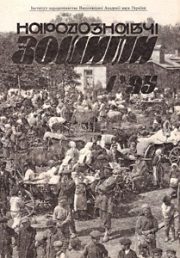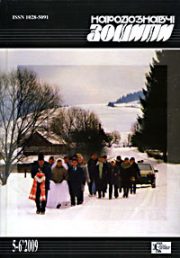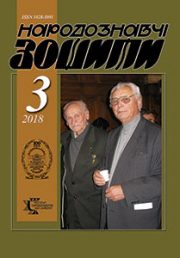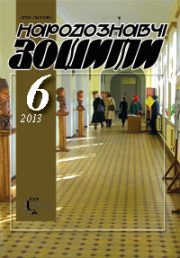The Ethnology Notebooks. 2024. № 3 (177), 532—538
UDK 930.2:[572-057.4(477)”28/19″:39:061.2НТШ]
DOI https://doi.org/10.15407/nz2024.03.532
ACTIVITIES OF IVAN RAKOVSKY IN THE ETHNOGRAPHIC COMMISSION OF THE NATIONAL ACADEMY OF SCIENCES
PATSAY Tamara
- ORCID ID: https://orcid.org/0000-0002-4469-250X
- Candidate of Historical Sciences,
- Scientific Secretary of the Ethnology Institute
- of the National Academy of Sciences of Ukraine,
- 15, Svobody Avenue, 79000, Lviv, Ukraine,
- Contacts: e-mail: patsay@nas.gov.ua
Abstract. Ivan Rakovsky (1874—1949) is a famous Ukrainian scientist. His activities had a great influence on the development of various areas of Ukrainian scientific life, he is known as a popularizer of science, a professor at the Ukrainian Secret University in Lviv, a full member, and later chairman of the SSSh, inspirer and editor-in-chief of the first Ukrainian encyclopedia — the Ukrainian General Encyclopedia.
The scientific environment that developed in the Ethnographic Commission of NTSh in the early twentieth century and consisted of I. Franko, Ph. Vovk, V. Hnatiuk, M. Hrushevsky and others attracted many researchers, one of them was I. Rakovsky. He began his anthropological research under the direction of Ph. Vovk, later with his own assistance received European training and was formed as a mature scientist.
The article explores various areas of Ivan Rakovsky’s collaboration in the Ethnographic Commission, such as participation in ethnographic and anthropological expeditions, publication and editorial activities, work at international conferences, participation in meetings of the EC, etc.
Thus, the purpose of the article is to explore the main activities of Ivan Rakovsky in the Ethnographic Commission of SSSh.
The object of the study is the contribution of Ivan Rakovsky to Ukrainian ethnology, the subject is the activity of the scientist in the Ethnographic Commission of SSSh.
The source base of the article was the minutes of the meetings of the Ethnographic Commission, the Chronicle of the SSSh and the epistolary, the periodicals of that time.
The chronological boundaries of the study cover the years of the scientist’s life – 1874—1949.
The research methodology is based on theoretical analysis, systematization and generalization, historical review and observations of the author.
Keywords: Ethnographic Commission, Shevchenko Scientific Society, Ivan Rakovsky, anthropology, ethnology, interwar period.
Received 5.06.2024
REFERENCES
- Golovatsky, I. (2004). Ivan Rakovsky (1874—1949): a biographical and bibliographical essay. Lviv [in Ukrainian].
- Franko, O. (2000). Fedir Vovk — scientist and public figure. Кyiv: Publishing house of the European University [in Ukrainian].
- Hlushko, M. (2015). Ivan Rakovskyi — researcher of anthropological features of Taras Shevchenko. The Ethnology notebooks, 5 (125), 999—1003 [in Ukrainian].
- Cheban, M. (2017). Ukrainian Scholars Taking Part in International Scientific Workshops (1919—1939): Organizing, Participation, Themes. Ukraine Poland: Historical Heritage and Public Consciousness (Vol. 10, pp. 72—89) [in Ukrainian].
- Sapelyak, O. (2000). Ethnographic researches in Shevchenko Scientific Society (1898—1939). Lviv [in Ukrainian].
- (1903). Chronicle of the Shevchenko Scientific Society in Lviv (Vol. 14) [in Ukrainian].
- Hlushko, M. (2010). Anthropological studies in Shevchenko Scientific Society (end of XIXth — thirty years of XXth century). Visnyk of the Lviv University. Series History (Issue 45, pp. 413—436) [in Ukrainian].
- (1906). Chronicle of the Shevchenko Scientific Society in Lviv (Part 28, issue IV) [in Ukrainian].
- Golovatsky, I. (2004). Selected letters by I. Rakovsky to O. Barvinsky, V. Hnatiuk, K. Studynsky, and others. Ivan Rakovsky (1874—1949): a biographical and bibliographical essay (Pp. 176—194). Lviv [in Ukrainian].
- (1910). Chronicle of the Shevchenko Scientific Society in Lviv (Vol. 41) [in Ukrainian].
- (1909). Chronicle of the Shevchenko Scientific Society in Lviv (Vol. 40) [in Ukrainian].
- Kotsiumbas, Oresta. (2021). Lviv state gymnasium with ukrainian language of teaching (1920s—1930s). Visnyk of the Lviv University. Series History. 2019—2021. Special Issue (Pp. 436—446) [in Ukrainian].
- (1911). Chronicle of the Shevchenko Scientific Society in Lviv (Vol. 45) [in Ukrainian].
- Rakovsky, I. (1918) Bones of Cheremis from ancient coffins in Tonshayiv, Kostroma province. Materials for Ukrainian ethnology (Part I, vol. XVII). Lviv [in Ukrainian].
- (1914). Chronicle of the Shevchenko Scientific Society in Lviv (Vol. 58—59) [in Ukrainian].
- (1918). Chronicle of the Shevchenko Scientific Society in Lviv (Vol. 60—62) [in Ukrainian].
- Central State Historical Archive of Ukraine in Lviv (CSHAU in Lviv). F. 309. Op. 1. Case 746 [in Ukrainian].
- Rakovsky, I. (1929). Prehistoric motifs in Ukrainian folk art. Materials for ethnology and anthropology (Vol. XX—XXI, pp. 163—186). Lviv [in Ukrainian].
- (1930). Chronicle of the Shevchenko Scientific Society in Lviv: for the years 1926—1930 (Vol. 69—70) [in Ukrainian].
- CSHAU in Lviv. F. 309. Op. 1. Case 38 [in Ukrainian].
- (1924, 13 june). All-Slavic Geographical and Ethnographic Congress. Dilo [in Ukrainian].
- Rakovsky, I. (1926). Proceedings of the 1st Congress of Slavic Geographers and Ethnographers in Prague 1924 [in Ukrainian].
- Sawicki, L. (Ed.). (1929). Proceedings of the 2nd Congress of Slavic Geographers and Ethnographers in Poland 1927 (Vol. I) [in Polish].
- CSHAU in Lviv. F. 309. Op. 1. Case 147 [in Ukrainian].
- (1927, 17 june). Slavic Scientific Association. Dilo [in Ukrainian].
- Czolowski, A. (1927). Lviv. The Past. Congress Guide of the 2nd Congress of Slavic Geographers and Ethnographers in Poland 1927 [in Polish].
- Rakovski, John (1930). The relationship between European race types in Ukrainians.. Proceedings of the 2nd Congress of Slavic Geographers and Ethnographers in Poland 1927 (Vol. II) [in French].
- CSHAU in Lviv. F. 309. Op. 1. Case 56 [in Ukrainian].
- Batakliev, I. (Ed.). (1938). Proceedings of the 4th Congress of Slavic Geographers and Ethnographers, Sofia 1936 [in Bulgarian].
- Manuscripts Department of the Vasyl Stefanyk National Scientific Library of Ukraine in Lviv. F. 252. Op. 1. Case 611 [in Ukrainian].







